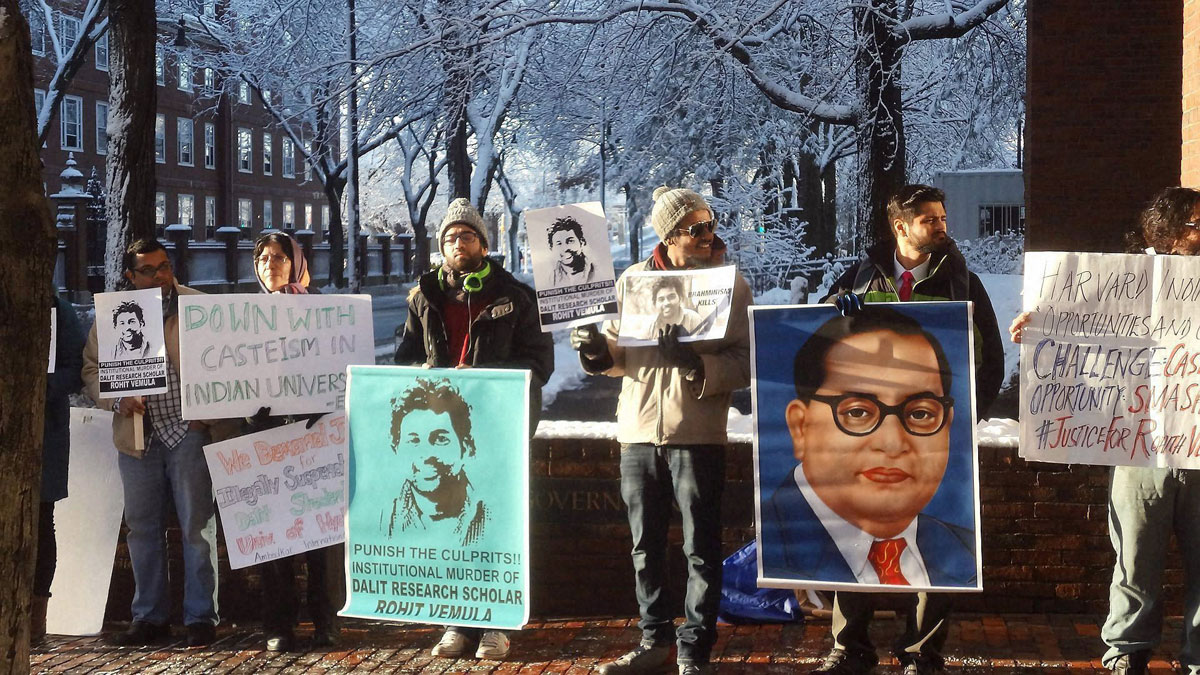DISCUSSING INDIA AT HARVARD
A group of Indian students from Harvard University holding a peaceful demonstration n front of a venue of the annual India Conference at Harvard in Boston, Mass., Feb. 6, in protest against the suicide of a dalit research scholar in Hyderabad, India. (Press Trust of India)
Students of Indian origin were thrilled as they got to hear from some of India’s brightest minds at the annual India Conference at Harvard University. From protests to politics, to social and economic issues to entertainment, every thing was discussed. Here are some of the notable quotes:
“Development through democracy is the biggest challenge today because in the heat of the moment people call for becoming some kind of an autocratic society,” said IT Minister Ravi Shankar Prasad.
“Progress is being made but not enough to reach everyone,” said Shashi Tharoor.
“I am against the word tolerance. You do not tolerate; you accept a friend. Why should you tolerate everything? It is a view either you accept it or not accept it? Why do you tolerate?” asked Kamal Haasan, writes Lalit K. Jha. (@HarvardUniversity, #IndiaConference2016, #KamalHaasan, #RaviShankarPrasad, #ShashiTharoor, #Siliconeer, @Siliconeer, #AamirKhan, #ShahrukhKhan, #Intolerance, #ChinaEconomy)
RAVI SHANKAR PRASAD
In an apparent dig at China, Communications and IT Minister Ravi Shankar Prasad, Feb. 7, warned against the impulse to become an autocratic society for attaining faster growth and said development through democracy is more stable.
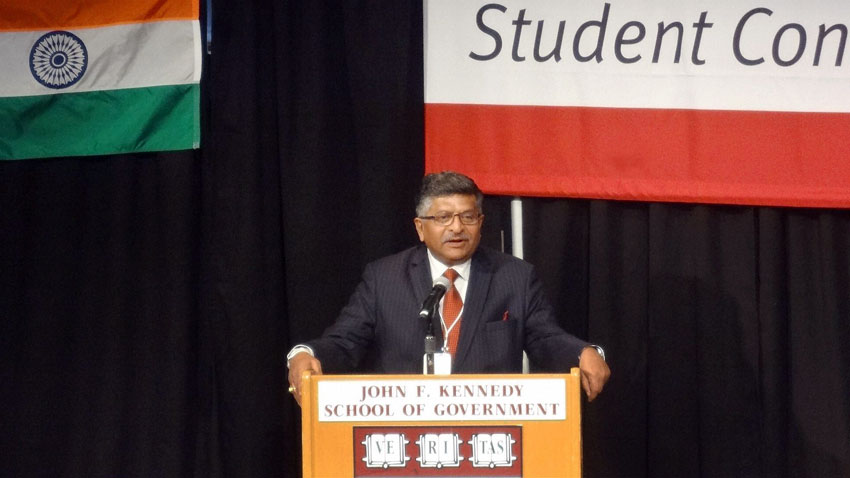
Referring to China’s fast growth rate during the past decades, he said in a democracy development may be slower but it is stable.
People in India, he said, want the government to deliver with good governance and transparency.
China, which is ruled by the Communist Party since 1949, witnessed close to double-digit growth for over three decades.
However, growth has fallen steadily over the past five years and China clocked 6.9 percent GDP growth in 2015, its weakest performance in a quarter century, with analysts warning of a hard landing for the world’s second largest economy.
Responding to a question, Prasad opposed the idea of disbanding the Indian Civil Services, which he argued brings in continuity and stability.
At the same time, he felt the need of creating opportunities for bringing fresh minds to governance.
Speaking on the phenomena of regional parties in Indian politics, senior member of parliament Jay Panda said that it would be foolish to write off regional parties, which have been there for the past few decades.
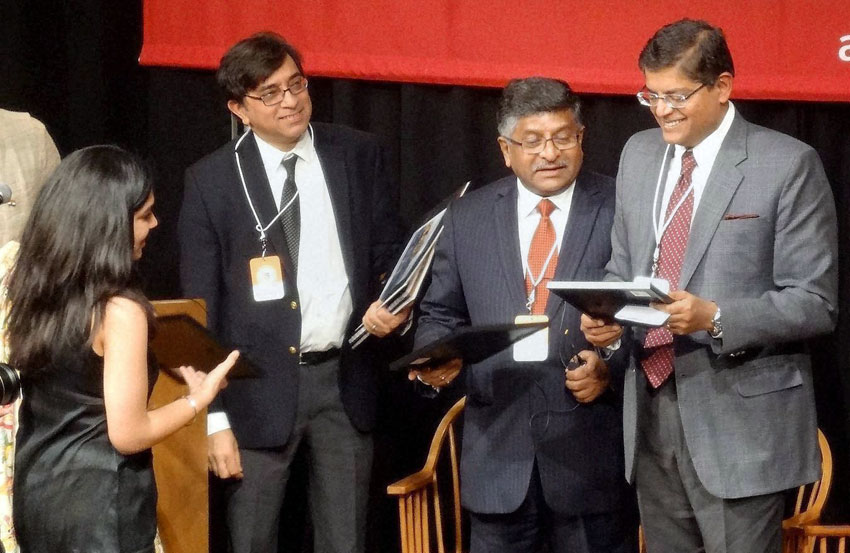
“They may have in some sense reached the peak of their popularity, but they are not going away any time soon,” he said, adding there is a gradual evolution of two coalition system rather than two parties in Indian polity.
Panda also referred to the massive use of social media in recent elections in India.
Gradually, large rallies are paving the way for more volunteers and staffers to do door-to-door campaigning.
“Despite this increase in engagement, Indian politics is still insular. It is not a level playing field,” Panda said referring to the dynasty politics in the country.
“For an outsider to enter the politics is not easy,” Panda said.
However, he acknowledged that the number of dynastic members in the Parliament have started to come down.
“Unless we have systematic changes, campaign finance reform, the Indian democracy will remain insular,” Panda said.
Jayprakash Narayan, founder of Lok Satta Party, said more than Indians, the rest of the world wants India to succeed.
This is mainly because of the aggressive behavior of China, and India is seen as a balancing and stable power.
However, for him, India has become an unwieldy republic.
“There is increasing gap between aspiration, policy and outcome,” he said, adding that India is among the worst in the world in terms of healthcare outcome and expenditure.
Narayan alleged that there is too much centralization of power in India.
“In the past 20 years, we have seen creeping centralization by consent,” he said.
With India placing high priority to cyber security, the government is in talks with a number of countries, including the U.S., for co-operation to check cyber espionage and other attacks, said the IT Minister.
“The Prime Minister himself has said, cyber security represents something like bloodless war. Therefore, cyber security is an agenda of great importance for our government,” Prasad, who was in Boston, Mass., to attend the annual India Conference of the Harvard University, told PTI.
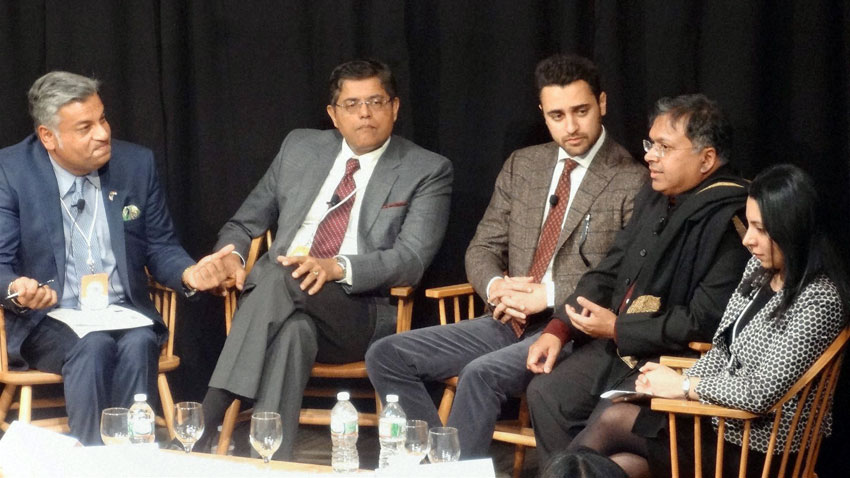
Emphasizing that India is very particular on the issue of cyber security, the minister said the government is in talks with a number of countries including the U.S. in this regard.
“Internet is the finest creation of human mind. It should not be allowed to be abused by a few. In that scenario there is greater co-operation among countries world over,” he said.
The minister said the ambitious Digital India campaign has aroused great interest about the country across the world and the total digital economy being pursued by India is going to be $1 trillion in the next two-three years.
“I see a lot of digital delivery of services happening (in the next few years),” he said, adding that governance is gradually moving towards on the mobile phone.
Underlining that programs initiated by India has “caught the fancy” of the world, Prasad said that American companies are “very keen” to partner in India’s growth story.
“This shows the interest being reflected in India’s turnaround story,” said Prasad, who held meetings with a large number of academicians, research scholars and top business executives on India and India related issues.
“May be the personal chemistry of the U.S. President (Barack) Obama and (Prime Minister) Narendra Modi, is also a reason for this kind of renewed interest,” he said.
SHASHI THAROOR
Taking a jibe at the Modi government, former minister and Congress leader Shashi Tharoor has said policies like ‘Make in India’ and hatred cannot go together as he asserted that “outrageous” statements against minorities by ruling party members only undermine the country’s soft power.
To attract foreign direct investment, which is key to the construction and modernization of the infrastructure sector and manufacturing, the Congress MP stressed on the need to maintain the pluralistic character of the country.
Before India tries to leverage its soft power to increase its standing in the world, Tharoor said first there is need to fix the problem at the domestic front.
“For us to be credible as a nation that enjoys and wields soft power, we have to fix our domestic problems first. The truth is that we have to do enough to keep our people, healthy, well and secure not just from ‘jihadi’ terrorism.
“If on one hand, we go around saying Make in India, Startup India and Digital India and want to attract foreign investors, we can’t do so if we are condoning hatred in India at the same time,” Tharoor said in reference to the flagship schemes launched by the Narendra Modi-led government.
“It is not good when people in the ruling party make outrageous statements against minorities. These are not good because they undermine the soft power of India,” Tharoor told the students in the packed Harvard Business School auditorium.
Tharoor asserted that in order to maintain India’s soft power, the larger idea of India needs to be sustained.
“An India that celebrates the common space of every identity, it would be a secure to be a Muslim, secure to be a kayastha… whatever you define yourself. Because all of those identities are made secure under the Indian identity,” he said.
Tharoor said if India wants to remain a source of attraction for the world, it must preserve the “precious pluralism like a civilizational asset.”
“It is not so good when women are assaulted on the streets of Delhi. It is not good when some people begin to fear that it is safer to be a cow than to be a Muslim in India today,” Tharoor said.
He also told the Indian students that one of his investor friends decided against investing in India because of acts of intolerance in the country.
Responding to a question, Tharoor said the Congress party has a “deep bench of talent.”
“Political parties live by electoral success. We have taken quite a beating in the last couple of years. Fortunes always change in politics. It (Congress) is certainly not as has been caricatured as the most corrupt party of India,” he said.
The Congress party happened to be in power when a number of corruption scandals took place, Tharoor said.
“Whoever had been in power would have been tarnished in the same way that happened to us,” he said.
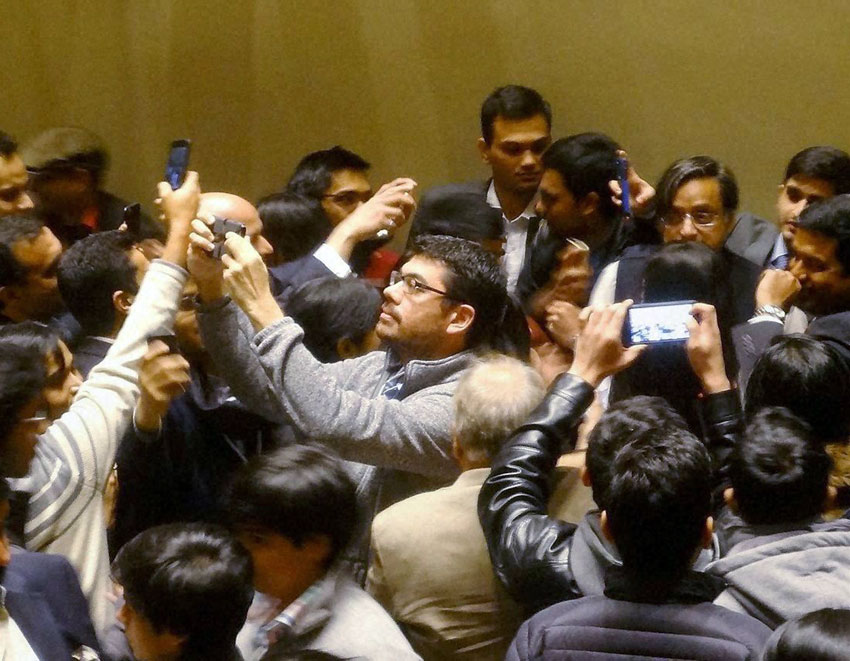
KAMAL HAASAN
Refusing to wade into the intolerance debate, actor Kamal Haasan has said he was against the word “tolerance” as he underlined that all communities need to “accept” each other to save the country from disintegration.
Haasan, during a “fireside chat” with students of the prestigious Harvard University, said the country has already lost its two arms—Bangladesh and Pakistan—and all efforts should be made to maintain the unity and integrity of the country.
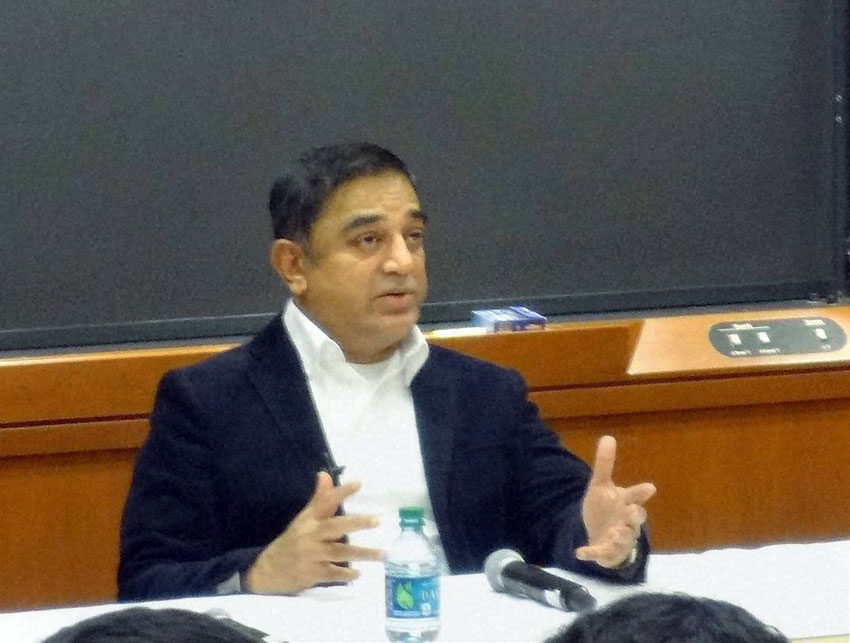
Citing the example of a sleeveless sweater knit in green thread among other colors, Haasan said, “It (India) is a sweater which is already knit with green thread (among other color wools). You just can’t pull (the green thread). There is no sweater left then.”
“We have already lost the sleeves of the sweater—Bangladesh and Pakistan (have) gone. It’s a sleeveless sweater So let’s keep the sweater. It’s getting cold,” he said amid applause from the young Indian students studying at the Harvard University and other higher educational institutions around Boston including the Massachusetts Institute of Technology.
Haasan’s answer came in response to a question from one of the students who wanted to seek his views on voices of intolerance coming from some of the popular Bollywood stars like Aamir Khan and Shah Rukh Khan.
“I am against the word tolerance. You do not tolerate; you accept a friend. Why should you tolerate everything? It is a view either you accept it or not accept it? Why do you tolerate?” Haasan asked.
“Intolerance is there because you are tolerating it. Do not tolerate. Accept the Muslims as your co-citizens. Do not tolerate them. Accept the Hindus (as your co-citizen). That’s the problem of tolerant. Accept it (Muslims) because you are not going to take away the green in your Indian flag,” the popular Indian actor told the audience.
The intolerance debate had raged in India recently with many writers, artists and civil society members expressing alarm over the issue.
Recalling that the rise of Hitler in Germany and imposition of emergency in India came through normal democratic process, actor Kamal Haasan said “constant vigil” is required to safeguard freedom of speech in a democracy.
“Democracy is often touted as the only bastion of freedom of speech. It is a work in progress. Constant vigil is necessary to safeguard it,” Haasan said at the annual India Conference of Harvard University.
“It is only through the offices of democracy that Adolf Hitler rose to the power. In the Indian political history, emergency was promulgated and voices were silenced,” he reminded.
In his keynote address, the “Vishwaroopam” star, who is a part of the reform committee that is going to recommend changes in the functioning of Central Board of Film Certification in India, said freedom of speech should not be taken for granted.
“I have taken the opportunity to put on record here and in India we can’t take freedom of speech for granted and complacently think that democracy automatically means freedom of speech,” Haasan, 61, said.
He, however, pointed out that he is not criticizing the democracy of India and, in fact, is proud of it and wants the country to set an example for the whole world.
“Not only India, but the world is in transition. The world is going to face new challenges, find new opportunities. We want India not to be complacent, but set world standards,” he added.
Haasan said “religion in politics” is not healthy.
“What Nehruji spoke of once of unity in diversity, now we are trying to lose it very fast. In a world of open source, protectionism cannot work like medieval times.
“Those evangelizing democracy nowadays want us to believe that it is the only hope for freedom of speech. I, as an artist, believe that freedom of speech is separate from the ruling political state.”
